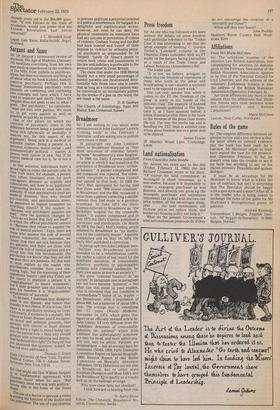Sargant and Szasz
Sir Dr Sargant's bittersweet review of' my book, The Age of Madness, (January 18) mentions everything from his own Past medical experiences to the wonders of the NHS, from syphilis to psychoanalysis, but does not mention anything at all about what my book is about, namely coercive psychiatry. Perhaps this is because institutional psychiatry rests squarely on combining and confusing two concepts and facts which I have tried to separate and clarify. Hence Dr Sargent does not seem to see to what I Point. "But psychiatry," he concludes, 'must not mix with politics. We must trY to get every patient as well as Possible, as quickly as possible." One of the pillars on which my criticism of psychiatry rests is the difference between being a patient and being sick (physically or mentally; it matters not, for this aspect of my urgument). Being sick is a medical or scientific matter. Being a patient is a Personal, economic, moral, social — and quintessentially political — matter. A Person with cancer is sick, but if he rejects medical care for it, he is not a patient.
In free societies, individuals have a broad right to reject the patient role. In New York State, for example, a person may refuse treatment even for such contagious diseases as syphilis and tuberculosis, and there is no legislation empowering doctors to treat him comPulsorily. If what psychiatrists treat are medical diseases, then why should Psychiatrists, and psychiatrists alone, be permitted to impose treatment on unwilling clients? If the answer is: "Because only psychiatric patients are mad," then the question changes to: "How do we know that they are mad?", to which the official psychiatric answer is: "Because they refuse to assume the role of mental patient." Ergo, there are those who assume the role of mental Patient voluntarily, the neurotics: we 'knout that they are sick because they are patients; and there are those who reject the role of mental patient and are thrust into this role involuntarily, the Psychotics: we 'know' that they are sick pecause they are patients. All this may at least explain to the reader why _PsYchiatrists consider their own reas°fling 'logic,' but the reasoning of their oPPonents 'lunacy'; and why if they use the courts to imprison a person it is hospitalization' to insure 'treatment', but if their prisoner uses the courts to gain his freedom it is litiginousness' sYMptomatic of 'paranoia'.
To be sure, I maintain that disagree
ment is not disease, and hence that !I? sanity is not illness. If this is true, then there is in psychiatry nothing to treat. Conversely, if madness is a malady, like cancer or heart disease; and if we agree, °n moral and political grounds, that _Persons with cancer or heart disease Tilould have a right to reject being cast I to the patient role — then why should Persons with schizophrenia and depression be denied this right? Dr Sargant has hot answered this question; indeed, he has not even addressed it.


































 Previous page
Previous page